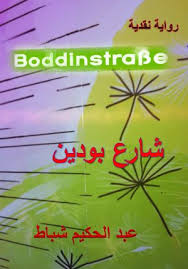
This Diwan will be held mostly in Arabic.
Do philosophy and literature shape our consciousness and relationships with others?
Diwan Al-Falsafa with Dr. Abdul-Hakim Shubat on the theses in his novel “Boddinstraße”.
In the next Diwan al-Falsafa on July 26 at 19h in Ulme 35 we will try to figure out what’s behind, or inside, the minds of Arab immigrant communities. Is our consciousness shaped by collective memory? Which role do philosophy and literature play in shaping this memory? How does it influence our relationship with others? These are the main questions Abdul-Hakim Shubat reflects on in his novel “Boddinstraße”.
Shubat dislikes everything that imposes authority on the human mind and thus curbs its ability to renew and develop. He emphasizes that human psychological and emotional needs have to be met, not fought. In “Boddinstraße”, he tries to show how the consciousness of generations and societies across history is mainly based on assumptions and viewpoints that certain groups promote and present as unquestionable truths. To do so, Shubat presents his character Karl to us, a man living in Boddinstraße. A churchgoer, neat and polite, who one Sunday finds himself in a mosque, and as a muslim, too. Through this kafkaesque transformation he is able to get inside the minds of members of the Arab and Muslim community in Berlin. He uncovers how politics and religion are being intertwined in order to achieve political goals or personal interests. Another, nameless, character works as a cleaner in a psychiatric ward and finds out through what its inmates tell him how the collective consciousness of society is being falsified.
Abdel Hakim Shubat will read some excerpts from his novel dealing with the points mentioned above, and we will discuss with him in which extent he succeeded in portraying the reality of Berlin’s Arab community. Is this portray a serious criticism of it and its behaviour, or just a contribution to exisiting stereotypes? And is he right in claiming a falsification of contemporary Arab and Islamic consciousness? And, lastly, can literature have a part in liberating this consciousness from its falsehoods?
Abdul Hakim Shubat studied philosophy and social sciences, theater, literary criticism, and religious sciences. He worked as a school teacher was a university lecturer in Syria. He studied both Theoretical Physics and Human Sciences as well as Social Theory at the Faculty of Philosophy in Berlin, where he did his PhD in philosophy in the field of human and social epistemology. He has been a supervisor at Arabic language centers for non-native speakers and is a social supervisor for language integration issues at CJD Berlin-Brandenburg, and a member of several scientific and literary societies. He published several researches and book in Arabic and German, including:
- [Broken Hearts] – Damascus, 1997 (play).
- [Small Dreams] – Damascus, 2000. (Novel)
- [Mental Reconstruction and Empirical Reality: A Contribution to Social Theory] – Berlin, 2011.
- [Oriental Tales from Berlin] – Kuwait, 2012. (Literary Collection)
- [Seedlings: Critical articles] – Kuwait, 2013. (Collection of essays)
- Boddinstraße: ein kritischer Roman [Boddinstraße: a Critical Novel] – Berlin, 2017. (Novel)
- [Erlangen School: Presentations in the Humanities and Social Sciences] – Berlin to be published in 2018.
- Translation project (into Arabic) in progress: Texts of the Das Nibelungenlied.
When? July 26th 2018, 7 pm
Where? Ulmenallee 35, 14050 Berlin-Westend, U-Bahn Neu-Westend (U2), Bus 104 Hessenallee, Bus M45 Kirschenallee, 15min Fußweg von der S-Bahn Westend (S42/S41)





